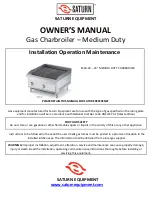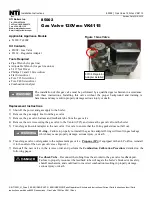
14
1.
Boilers may be vented horizontally as shown in
Figure 8, Page 13
.
Vent pipe is pitched
down
from
boiler to vent termination. Do not connect other
appliances to this vent.
2.
Vent Pipe Material:
A. UL Listed Z-Flex Z-Vent stainless steel vent pipe
from boiler to vent termination,
-or-
B. UL Listed Heat-FabSaf-T-Vent stainless steel vent
pipe from boiler to vent termination,
-or-
C. UL Listed Flex-L StaR-34 stainless steel vent pipe
from boiler to vent termination,
-or-
D. UL Listed ProTech FasNSeal stainless steel vent
pipe from boiler to vent termination.
3.
Clearance to Combustible Materials: For stainless steel
vent pipe maintain 6” minimum air space clearance to
combustible materials.
4.
Vent Pipe Size:
A. 2, 3, 4 and 5 section boilers use 3” vent pipe
connected directly to the outlet of the induced draft
blower.
B. 6 and 7 section boilers use 4” vent pipe, starting
with a 3” to 4” stainless steel vent pipe transition
that is connected directly to the outlet of the
induced draft blower. Do not use 3” vent pipe on 6
or 7 section boilers.
5.
Vent Pipe Length:
A. For stainless steel vent pipe, the maximum
horizontal vent length is 30 feet plus one 90
°
elbow
plus termination
fi
tting.
B. Minimum horizontal vent length for all vent
materials is 2 feet plus one 90° elbow plus
termination
fi
tting.
C. For additional elbows reduce the maximum vent
length as shown:
• 3” - 90° elbow - reduce vent length 3 feet per
each 3” elbow
• 4” - 90° elbow - reduce vent length 6 feet per
each 4” elbow
Example:
6 section boiler has 3 elbows plus the
termination
fi
tting. This means 2 additional 4” elbows will
be used, at 6 feet per elbow. This is equivalent to 12 feet
of pipe (2 x 6 =12), therefore maximum vent length is now
18 feet (30 -12 =18).
6.
Vent Termination Fitting: For all vent pipe materials,
you may use either:
A. A 90° elbow pointing down,
fi
tted with a minimum
1/4” mesh screen to keep out rodents and birds.
The elbow shall be of the same material and size
as vent pipe. The elbow exit should be at least 6”
away from exterior wall as shown in
Figure 8
.
-or-
B. Tjernlund VH-1 Series side wall vent hood. For 2,
3, 4, 5 section boilers use VH-1-3”, For 6, 7 section
boilers use VH-1-4”.
7.
Vent Pipe Termination Location See Figure 9 :
A. When venting through combustible walls,
combustible clearances must be considered. The
VH-1 Side wall vent hood provides both the outside
vent termination and a double wall pipe for passing
through a combustible wall up to 8” thick (VH-
1-4”) or 9” thick (VH-1-3”). The hole in the wall
must be 6¼” square for 3” vent pipe and 7 1/2”
square for 4” vent pipe, in order to insert the VH-1
side wall vent hood. The VH-1 may also be used in
noncombustible walls.
B. If the 90° elbow is the termination
fi
tting of choice,
then the single wall pipe will be passing through
the side wall. For combustible walls, a UL listed
thimble shall be used where the single wall pipe
passes through the wall. For combustible walls
using Z-Vent, Saf-T-Vent, or StaR-34 vent pipe,
use the following:
• 3” vent pipe - use Simpson’s Duravent 3” thimble
• 4” vent pipe - use Simpson’s Duravent 4” thimble.
Maximum wall thickness with this thimble is 7
inches.
For combustible walls using ProTech FasNSeal where the
single wall vent pipe must pass through the side wall, a UL
Listed FasNSeal wall thimble shall be used.
The thimble is adjustable for different wall thickness, with a
maximum wall thickness of 7 inches. Seal the thimble along
the outside edge of the plate with caulk or silicone and
fasten to the wall with screws or nails.
C. For single wall pipe through non-combustible
walls, the hole through the wall need only be large
enough to maintain the pitch of the vent pipe, and
provide proper sealing. A thimble is not required
for single wall pipe passing through noncombustible
walls.
HORIZONTAL VENTING INSTRUCTIONS















































